After our week in Belfast was over we headed for the Antrim Coast to Corymeela. Corymeela is an organization much like Glencree that provides safe space for victims and perpetrators to heal. I really enjoyed the weekend we spent there, beautiful scenery, caring people, and no more murals of men in balaclavas with automatic weapons like we had seen for the past week.
I think the best way to describe Corymeela is through a story we were told on the first day we were there. It is a Presbyterian organization and had some detractors because of their openness to people of different faith's and political viewpoints, most notably of these detractors, the Reverend Ian Paisley. If you don't know who Ian Paisley is, you're better off. He is a member of British Parliament, a member of the NI Assembly, and a local counselor in Antrim as well as the former leader of the Democratic Unionist Party. He is also a minister in the Free Presbyterian Church of Ulster (a sect he made up after leaving the Presbyterian Church). He is famous for his "Ulster says NO" campaign against accommodations for the Nationalist/Republican community of Northern Ireland (funny enough I have heard many people in the news over here comparing this to the GOP's recent strategy of non-cooperation at the cost of the American citizen). He was also described by a UUP politician that we met at Stormont as a "gay-bashing" and "anti-Catholic" (this politician was also a Unionist, but even he thinks Paisley is nuts). Anyways back to Corymeela. Paisley was staunchly against what these Presbyterians were doing and said they were betraying their faith. He stood at the bottom of the hill below Corymeela with a loud speaker spouting off hateful garbage, and the person who told us the story stressed that he never actually came onto the premises and talked to anyone or saw what was going on. I honestly think that is the only way someone could ever find fault with the Corymeela Community, if they never really knew what they were about. I couldn't tell you Corymeela's mission statement, or an exact definition of the work they do, but I could tell you that the whole time I was there I felt welcomed, safe, and surrounded by sincerity. If Paisley had taken the time to actually communicate with these people he would have been proud to see what his fellow Christians were doing in his community.
Derry
While in Derry we stayed with host families for a week. Myself and another student stayed with a single father of 2 who's daughters were both living outside Ireland. His name was Shaun and he told us a little bit about what it was like in his old neighborhood, Creggan, a former "no-go" area for British Police and Army. It was called a "no-go" area because if the British security forces stepped foot inside, they would be attacked. This was because the Provisional IRA saw itself as defending this Nationalist ghetto from a sectarian state. In all fairness they may have been correct. This was a community that had seen Bloody Sunday where 13 men and teenage boys were murdered by British Army Paratroopers during a civil rights march. They also lived with the horror of internment without trial, where their family members would be arrested, interrogated (usually beaten), and left in a cell for years on end without a charge brought against them.
I can not imagine what it was like for Shaun to live in a climate like that, but amazingly, he is a normal guy. He doesn't possess hatred in his heart for the British state, and was a quite enjoyable person to strike up a conversation with throughout the week. He told us the first night that he was "not political". Either that was a joke or he has a different perception of what is political. Every conversation we had got back around to politics, and he most definitely had an opinion. I guess for a guy coming from an epicenter of the Troubles, being political has a much different meaning.
We also met a man Leo Coyle, who was interned without trial in the 60s/70s. He gave us a tour of Derry along the infamous city walls that are prevalent in the story of William of Orange vs. King James. Leo was in jail for 11 years without being charged for a crime, and while he freely admits his IRA membership, he was not in the organization before being interned. He went to jail when he was 17 years old and was only released for a few hours until he was 28. The few hours he was released in between that time he described to us in vivid detail, they were hours that changed the course of his life. While in jail his mother passed away, and he was allowed to go to the funeral. After the funeral of his mother, who he had not been able to spend time with as she took sick and died, he went to visit his old friends and see what was going on. He was walking by Free Derry Corner, the entrance to the Bogside where he lived, and another "no-go" area. All of a sudden he heard a sniper's gunfire from on top of the city walls where the British Army had a post. He looked around to see who it hit and saw a 14 year old boy struck by a bullet laying in front of him. He told us how he held the boy as he died and he was never the same again. What hope was there in Leo's life at this point for a non-violent end to the conflict? Here he was jailed because he was a young, male, Catholic, living in Northern Ireland, who just witnessed an innocent boy murdered in cold blood by the British Army.
I think it is far to easy to sit back, far away from real life situations that people face around the world like this one, and say that violence is never the answer. But if you were Leo Coyle, what would you have done? Taken part in non-violent struggle and waited for the next sniper's bullet to kill you or someone you love? Some people did experience what Leo experienced and did pursue equality through non violent means, and that is commendable, but you also cannot blame Leo for joining the IRA when he was finally released from prison. Leo makes no apologies for his decision to join the IRA but also said he was part of an organization that at some points hurt innocent people. He know makes it his life's work as a youth worker and counselor to reconcile the hurt he may have caused.
Leo's story is a powerful one, and most definitely one I will never forget. He was an interesting guy and myself and another student had the opportunity to sit down and talk more in depth with him over lunch at the community center he frequents. He shared a funny story with us which he amazingly tied into a moral lesson. When he was in jail, him and his cell mate dug a tunnel for a year and a half. He described how he was so close to being free, then the rain came. The rain collapsed the tunnel and it led straight to his cell. The two men were beaten and punished severely for what they had done. After laughing about his unfortunate break of bad luck, he tied it into his words of wisdom for us. He said that if he was imprisoned now you could bet he wouldn't be able to dig any tunnel's, moral of the story: take advantage of being young.

Antrim Coast

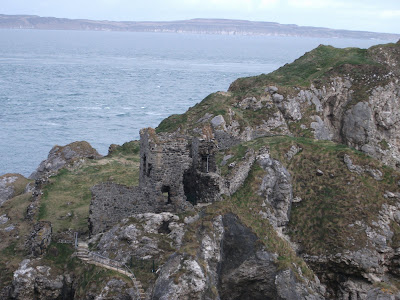
Why you would ever chose to build a castle on a narrow cliff that is hard to get to under any circumstances is beyond me.

Giant's Causeway
Ian Paisley disrupts the European Parliament by shouting at Pope John Paul II, "I denounce you Antichrist! I refuse you as Christ's enemy and Antichrist with all your false doctrine."

Free Derry Corner
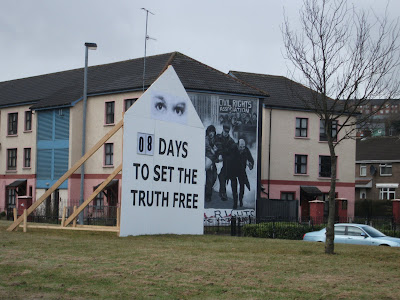
Countdown untill the Bloody Sunday Inquiry comes out. Bloody Sunday was in 1972, the inquiry was supposed to come out last month, the victims' families still have not recieved the findings.
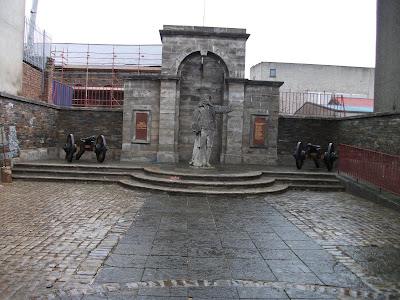
I forget this guy's name, but he was a reverend during the Siege of Derry who inspired the Protestants to reject Catholic King James. The city of Derry erected this statue and it used to sit on the city wall overlooking the Bogside (the Catholic ghetto) with a bible in one hand and a sword in the other pointing at the Catholic houses. They eventually moved it and put it inside gates because the IRA blew it up so many times.

Behind the graffiti is a mural for a few Nobel Peace Prize winners, Mother Theresa, Mandela, King, and Derry's own John Hume

Bloody Sunday memorial that reads, "Their epitaph is in the continuing struggle for Democracy."
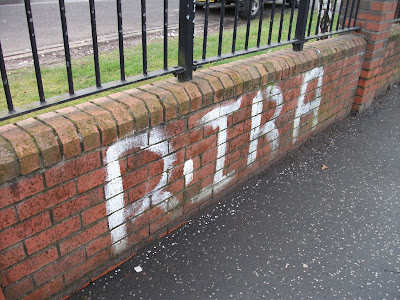
Real IRA- "dissident Republicans" who split from the Provisional IRA after the Provisional leadership agreed to the cease fire without achieving Irish Unity. The day we were leaving the Real IRA hijacked a few cars and held people at gunpoint while planting 4 fake explosives. I'm not sure how that brings them closer to a United Ireland than doing what the Provisionals did and entering government.
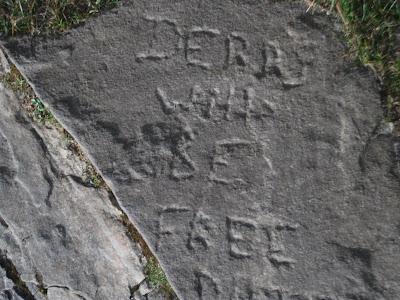
"Derry will be free" written on the wall of an old fort in Donegal.

A youth club in a Loyalist neighborhood that said they started to keep kids from joining the UVF and UDA, but if you look all the way to the left they have a UDA mural on the wall. The woman who runs it tried to tell me why she keeps it up there (bullshit).

This bar got its name because it was the last place people would get a drink before they left Ireland for America.
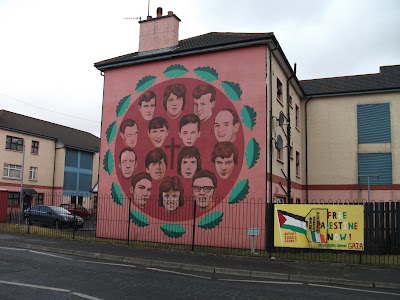
Mural for the victims of Bloody Sunday, some as young as 17. And a boycott Israeli goods poster.

No comments:
Post a Comment